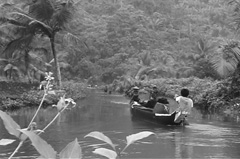The Drown Sea
Laut yang Tenggelam INDONESIA / 2006 / Indonesian, Sundanese, Javanese / Color, B&W / Video / 94 min
INDONESIA / 2006 / Indonesian, Sundanese, Javanese / Color, B&W / Video / 94 min
Director: Yuslam Fikri Anshari (Yufik)
Photography: Suherman
Editing: Moh. Syafari Firdaus, Yuslam Fikri Anshari
Research: Dhini Yulietta Sari, Siti Fikriyah
Producer: Moh. Syafari Firdaus
Executive Producers: Moh. Syafari Firdaus, Siti Hapsari
Production Company, Source: Komunitas Perfilman Intertekstual (KoPI)
The brackish-water region of Segara Anakan Lagoon is transforming into dry land due to silting occurring ever more rapidly since the 1980s. This is beginning to affect the lives of the Kampung Laut people, who have been running fisheries and have “lived on the sea, above the fishes” for generations. “New” residents move to the expanding dry land and forests to cultivate the earth, amid the arrival of massive cement mining boats and debates regarding the pros and cons of deforestation. The fishermen consider the fact that they can no longer make a living from fishing, as they maneuver their way around the new trees that are sprouting and overtaking the water. Their opinions intertwine above the “drowning” sea as if it is a puzzle to be solved, as each tries to accept the changing land and scenery.
[Director’s Statement] The Drown Sea is my sixth film, and my first full-length documentary film. The agrarian problem is surely important to me, but the big concern I want to share in this film is about the daily lives of the Kampung Laut people as they have to face changes in their environment.
I made this film with my colleagues in Komunitas Perfilman Intertekstual (Intertextual Film Community, also known as KoPI), and with the assistance of the Purwokerto Legal Aid Office, which has a women’s development program in the Kampung Laut area.
In the process, we made this film “participatory” by encouraging the Kampung Laut communities to share their ideas. That’s why in this film we let people tell their own stories; we try to limit ourselves to collecting, compiling, composing, and “packing” them. In that way, we hope this film belongs not only to us (as filmmakers), but also to them.
 Yuslam Fikri Anshari (Yufik)
Yuslam Fikri Anshari (Yufik)
Yuslam Fikri Anshari (known as Yufik) was born in Bandung, Indonesia, in 1972. He graduated in 1997 from the Department of Cultural Documentation in the Faculty of Art at Padjadjaran University in Bandung. He is a self-taught filmmaker, starting as a cameraman. He is a member of the Intertextual Film Community (KoPI)—a small audio-visual working group especially active in documentary filmmaking—and has been involved in numerous KoPI film productions. His films often treat agrarian problems, and have been screened at many peasant communities in West Java. |
